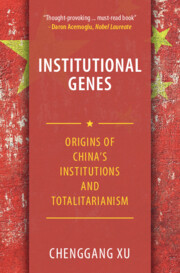
- Coming soon
- Publisher:
- Cambridge University Press
- Expected online publication date:
- June 2025
- Print publication year:
- 2025
- Online ISBN:
- 9781108894708

This book explores the origins and evolution of China's institutions and communist totalitarianism in general. Contemporary China's fundamental institution is communist totalitarianism. Introducing the concept of “institutional genes” (IGs), the book examines how the IGs institutional genes of Soviet Russia merged with those of the Chinese imperial system, creating a durable totalitarian regime with Chinese characteristics – Regionally Administered Totalitarianism. Institutional Genes are fundamental institutional elements that self-replicate and guide institutional changes and are empirically identifiable. By analyzing the origins and evolution of IGs institutional genes in communist totalitarianism from Europe and Russia, as well as those from the Chinese Empire, the Chinese Communist Revolution, the Great Leap Forward, the Cultural Revolution, and post-Mao reforms, the book elucidates the rise and progression of communist totalitarianism in China. The ascent of communist China echoes Mises' warning that efforts to halt totalitarianism have failed. Reversing this trend necessitates a thorough understanding of totalitarianism.
‘Why did China become a totalitarian nation? What is the connection between Chinese communism and that in the Soviet Union, and what accounts for their differences? How might we expect the Chinese Communist Party to evolve in the future? Chenggang Xu gives fascinating answers to all these questions and many more in this bold but carefully argued book that is deeply rooted in historical and economic analysis.’
Eric S. Maskin - Adams University Professor and Professor of Economics and Mathematics, Harvard University; co-recipient of the Sveriges Riksbank Prize in Economic Sciences in Memory of Alfred Nobel (2007)
‘Why does democracy flourish in some countries but not others? Many people expected that China’s meteoric rise would lead to the embrace of democracy, but this has not happened. Chenggang Xu’s fascinating book argues that the reason is China’s imperial tradition and the acceptance of limits on individual freedom and property rights, what he calls institutional genes. Engaging with the greatest thinkers, Xu applies the same idea to explain the growth of democracy in the West, but not in Russia. This is a must-read for anyone interested in arguably the most important issue of our time.’
Olivier Hart - Lewis P. and Linda L. Geyser University Professor, Harvard University; co-recipient of the Sveriges Riksbank Prize in Economic Sciences in Memory of Alfred Nobel (2016)
‘We hear much about China’s innovativeness, its state capitalism, its market system, or its modernization. This thought-provoking book argues otherwise. It documents through historical, institutional and economic analysis that China’s political and economic system is still totalitarian, despite the economic reforms initiated by Deng Xiaoping. Xu argues that communist rule changes not only institutions but many important aspects of culture in a highly persistent manner, and the Chinese system today cannot be understood without its ‘totalitarian institutional genes’, which have shaped the current Chinese economy, social life and Communist Party rule. This is a must-read book for anybody interested in China and the complex world order that is emerging today.’
Daron Acemoglu - Institute Professor, MIT Economics; co-recipient of the Sveriges Riksbank Prize in Economic Sciences in Memory of Alfred Nobel (2024)
‘With unblinking focus, Chenggang Xu picks apart the historical and institutional genes of totalitarianism in modern China. He illuminates a new understanding of how China’s governance developed from its roots in Imperial China and Russian Bolshevism. Instantly, this masterpiece of historical and political-economic analysis becomes the definitive reference to which anyone concerned with China’s political system must turn. Will constitutional freedoms have a chance in China? You must read this book.’
Darrell Duffie - Adams Distinguished Professor of Management and Professor of Finance, Graduate School of Business, Stanford University
‘Chenggang Xu, the famous economist who, among others, wrote the classical paper on the institutions underlying China’s growth miracle, now delivers what will likely be seen as the definitive analysis of the institutional roots of China’s ‘regionally administered totalitarianism’. Xu brilliantly analyzes China’s failure to introduce constitutional rule in the 20th century, using history and the influence of the Russian revolution. China’s millennial imperial system was much more autocratic than absolutist monarchies. This facilitated the import and adaptation of Bolshevik institutions, creating China’s unique form of totalitarianism. A deep and extremely thoughtful analysis that is key to understanding contemporary China.’
Gerard Roland - E. Morris Cox Distinguished Professor of Economics and Professor of Political Science, University of California, Berkeley
‘The largest living thing in the world is not a whale but a huge and little-noticed subterranean fungus called Armillaria ostoyae. Similarly, the largest political organism, as Chenggang Xu shows in this startling and important book, is a communist totalitarianism whose ‘institutional genes’ recur at different times and places but are always determinative. Pretty words disguise merciless violence, human beings are reduced to roles, and it is the system, not its captives, that enjoys autonomy. But Xu is no starry-eyed conspiracy theorist. He comes out of the system himself, was educated at Harvard, and offers sober analyses.’
Perry Link - Professor Emeritus of East Asian Studies, Princeton University
 Loading metrics...
Loading metrics...
* Views captured on Cambridge Core between #date#. This data will be updated every 24 hours.
Usage data cannot currently be displayed.